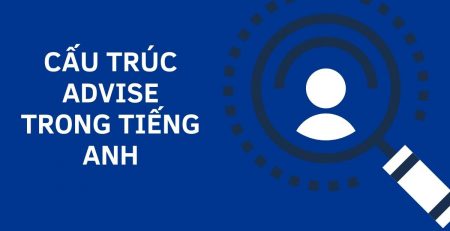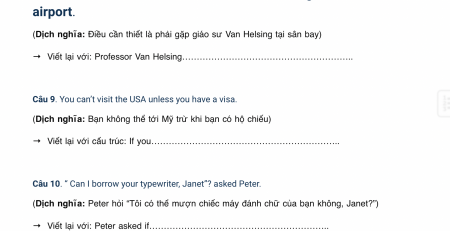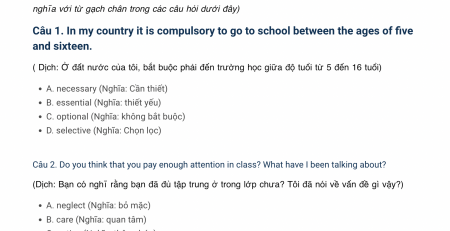Bài tập thì tương lai đơn có đáp án chi tiết

Trong tiếng Anh, sau khi nắm vững được kiến thức về ngữ pháp, người dùng cần phải đầu tư thời gian để rèn luyện chúng. Việc thực hành, ôn luyện kiến thức bằng việc làm bài tập thì tương lai đơn (Simple Future Tense) là một việc rất quan trọng để ghi nhớ và củng cố lại toàn bộ kiến thức của thì tiếng Anh quan trọng này. Thì tương lai đơn được sử dụng rất nhiều cả giao tiếp trong cuộc sống cũng như xuất hiện nhiều trong các bài thi, bài kiểm tra, nên việc nắm rõ cách dùng, công thức câu thì này là điều cơ bản nhất với người học tiếng Anh. Bài viết dưới đây PATADO sẽ cung cấp tổng hợp những bài tập thì tương lai đơn từ cơ bản đến nâng cao cùng đáp án chi tiết nhất. Hãy cùng khám phá ngay!
Tham khảo thêm:
- Dấu hiệu nhận biết thì tương lai đơn
- Bài tập thì hiện tại hoàn thành tiếp diễn có đáp an
- Bài tập thì tương lai tiếp diễn có đáp án
Bài tập thì tương lai đơn cơ bản, nâng cao
Cùng Patado ôn lại các kiến thức trọng tâm của thì tương lai đơn (tổng hợp các thì trong tiếng anh) trước khi đi sâu vào các dạng bài tập thì tương lai đơn cụ thể nhé.
A. Ôn lại kiến thức thì tương lai đơn cần nhớ
1.1. Cấu trúc thì tương lai đơn
| Câu khẳng định | S + WILL/SHALL + V(nguyên mẫu) | I will go to the supermarket tonight
(Tôi sẽ đi siêu thị vào tối nay) |
| Câu phủ định | S + WILL NOT/WON’T + V(nguyên mẫu) | He won’t tell me the truth.
(Anh ta sẽ không nói cho tôi sự thật đây) |
| Câu nghi vấn | Câu hỏi: WILL/SHALL + S + V(nguyên mẫu)
Trả lời: Yes, S + WILL./No, S + WON’T. |
Will he accept her friend invitation?
(Anh ấy sẽ chấp nhận lời kết bạn của cô ấy chứ?) |
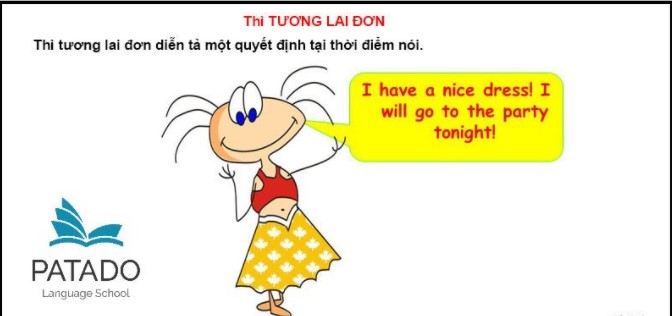
Thì tương lai đơn được dùng khi bạn không hề có kế hoạch hay quyết định nào trước đó
1.2. Dấu hiệu nhận biết thì tương lai đơn
| Trạng từ chỉ thời gian trong tương lai | Động từ chỉ quan điểm |
|
|
1.3 Cách dùng thì tương lai đơn
| Cách dùng | Ví dụ |
| Diễn đạt một quyết định, một ý định nhất thời/tự phát ngay tại thời điểm nói. | I will come back my company to take my laptop which I have forgotten.
(Tôi sẽ quay trở lại công ty để lấy chiếc máy tính xách tay mà tôi để quên) |
| Diễn đạt quan điểm, dự đoán không có căn cứ của một cá nhân/nhóm. | I think she will go to the gym room tonight.
(Tôi nghĩ cô ấy sẽ đi phòng tập gym vào tối nay) |
| Diễn tả một yêu cầu, lời đề nghị hay lời hứa | Will you please bring me that bag?
(Bạn làm ơn mang cái túi kia cho tôi được không?) |
| Dùng trong câu điều kiện loại một, diễn tả một mục tiêu, một giả định có thể xảy ra ở hiện tại ngay sau đó hoặc tương lai. | If it is sunny, we will go out to the park.
(Nếu trời nắng, chúng tôi sẽ đi ra ngoài công viên chơi ) |
B. Các dạng bài tập của thì tương lai đơn (cơ bản, nâng cao)
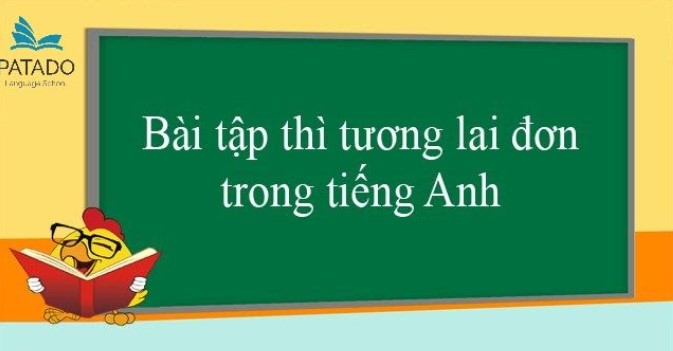
1. Bài tập thì tương lai đơn cơ bản
♠ Bài tập 1: Chia động từ trong ngoặc
- You (earn) …a lot of money.
- He (travel)… to France next year.
- Tomorrow, you (meet) …lots of good business people.
- Everything (be)… okay.
- But all these things (happen / only) … if he marry she.
- Everybody (adore) …children.
- She (not / have) …trouble nothing.
- Many people (serve) …my mother.
- They (anticipate)… soccer results tonight.
- There (not / be)… anything left to tell for.
* Đáp án bài 1:
- will earn
- will travel
- will meet
- will be
- will only happen
- will adore
- will not have
- will serve
- will anticipate
- will not be
♠ Bài tập 2: Sử dụng các gợi ý sau để sắp xếp thành câu hoàn chỉnh
- come/restaurant/Will/you/tonight?
- They/won’t/stay/here/tomorrow
- She/help/my/mother/take/will/care/of/her/cats/tomorrow/morning
- My/always/love/mother/will/always/love/you.
- Hoa/and/will/not/be/friends/Lan/anymore.
* Đáp án bài 2:
- Will you come restaurant tonight?
- They won’t stay here tomorrow
- She will help my mother take care of her cats tomorrow morning
- My mother will always love you.
- Hoa and Lan will not be friends anymore.
♠ Bài tập 3: Tìm và sửa lỗi sai
- I are going shopping with my sister tomorrow.
- If she hates her job, what do she do?
- We spend two months in China with our family to find out.
- The plant died because of lack of sunshine.
- I am going think my dad knows a lot of things
- If it stop raining soon, they will play badminton in the yard.
* Đáp án bài 3:
- am going → will go
- do she do → will she do
- spend → will spend
- die → will die
- knows → will know
- stop → stops
♠ Bài tập 4: Hoàn thành những câu sau đây bằng cách chia động từ ở thì tương lai đơn (will hoặc tobe going to)
- When I and my younger sister get home, we ___________ (have) dinner.
- We know Jim ___________ (feel) very happy if his team win the match.
- My class has already decided on our next summer holiday. We ____________ (do) a tour of Ha Long bay.
- Emily thinks that the BTS’s concert __________ (be) really exciting.
- “What are your plans for this morning?” I ________ (meet) my best friends and then go to a wedding.
- If Trung revise for the exam, I’m sure him ________ (get) a good result.
- The weather forecast is very bad for the next few days. It _________ (be) heavy rain.
- Jenifer can’t come on the march tomorrow. She ___________ (look after) her cousins.
- In the future, We think humans ___________ (wipe out) many different species.
- Mary is buying some butter and eggs because she _________ (make) a cake later.
- This homework is very easy. I know you __________ (do) it very quickly.
- In five years time, my younger brother _____________ (be) at university.
- I want to get my granmother a birthday present. But I _____________ (not buy) it today.
- Jun’s suitcases are packed. He ______________ (go) on holiday.
- If we go to Campodia, we ____________ (take) lots of pictures.
- My momther thinks it ______________ (snow) tomorrow.
- It’s very late! Hurry up or we ___________ (be) late for school.
- Look at that man at the top of that house! He ___________ (fall).
- When my little sister go home, she ____________ (watch) TV. She doesn’t want to miss her favourite program.
- I’m sure you ___________ (lose) the match.
* Đáp án bài 4:
- will have
- will feel
- are going to do
- will be
- am going to meet
- will get
- is going to be
- is going to look after
- will wipe out
- is going to make
- will do
- will be
- am not going to buy
- is going to go
- will take
- will snow
- will be
- is going to fall
- will watch
- will lose
♠ Bài tập 5: Dùng thì tương lai đơn để chia dạng đúng của động từ
- Kelvin (earn)………. a lot of money.
- I and Thanh (travel) ……………. around the world.
- We (meet) ……………. lots of interesting people.
- Everybody (adore) ……………. him.
- They (not / have) ……………. any problems.
- Many people (serve) ……………. our.
- Linh (anticipate) ……………. your wishes.
- There (not / be) ……………. anything left to wish for.
- Everything (be) ……………. perfect.
- But all these things (happen / only) ……………. if you marry Jinny.
* Đáp án bài 5:
- will earn
- will travel
- will meet
- will adore
- will not have
- will serve
- will anticipate
- will not be
- will be
- will only happen
♠ Bài tập 6: Tìm lỗi sai và sửa lại cho đúng trong các câu sau
- If Linda loves her job, what do she do?
- We spend a week in Laos with our parents to find out.
- The plant die because of lack of sunshine and water.
- I think my manager remember to do everything.
- If it stop raining soon, my class will play football in the yard.
* Đáp án bài 6:
- do she do ➔ will she do
- spend ➔ will spend
- die ➔ will die
- remembers ➔ will remember
- stop ➔ stops
♠ Bài tập 7: Dùng các từ cho sẵn hoàn thành các câu sau ở thì tương lai thể phủ định và nghi vấn
- ( Thuy / answer / the question)
- (Laura / read / the book)
- (they / drink / wine)
- (David / send / the postcard)
- (He / catch / the ball)
- (Matthew / open / the door) ?
- (They / listen / to the radio)
- (Brian / eat / fish)
- (you / give / me / the cake) ?
- (This computer / crash)
* Đáp án bài 7:
- Thuy won’t answer the question.
- Laura won’t read the book
- Will they drink wine?
- David won’t send the postcard.
- He won’t catch the ball.
- Will Matthew open the door?
- They won’t listen to the radio
- Brian won’t eat fish.
- Will you give me the cake?
- This computer won’t crash
2. Bài tập thì hiện tại đơn nâng cao
♠ Bài tập 1: Dùng will hoặc tobe going to điền vào chỗ trống để hoàn thành câu
Câu 1:
- A: We don’t have any watermelon.
- B: I know. I …………….. get some from the store.
Câu 2:
- A: We don’t have any meat.
- B: Really? I ………………. get some from the store then.
Câu 3:
- A: Why do you need to borrow your brother suitcase?
- B: I ………………. visit girlfiend’s parents in Scotland next month.
Câu 4:
- A: I feel cold.
- B: I ………….. turn the heating on.
Câu 5:
- A: Are you going to John’s birthday party tonight?
- B: Yes. Are you going too? I …………. give him a gift.
Câu 6:
- A: What are your plans after you leave this company?
- B: I …………… work in a hospital in Ha Noi. I leave on the 15th
Câu 7:
→ (The phone rings)
A: I ………………. get it!
Câu 8:
A: Are you ready to order for meal?
B: I can’t decide … Okay, I ……………… have the hamburger, please.
Câu 9:
A: Are you busy tonight? Would you like to have milk tea or coffee?
B: Sorry. I ……………. go to the history with my dad. I’ve been planning to take care him
all day.
Câu 10:
A: Why are you carrying a hammer?
B: I ……………. put up some pictures and do something.
* Đáp án bài 1:
- am going to
- will
- am going to
- will
- will
- am going to
- will
- will
- am going to
- am going to
♠ Bài tập 2: Hoàn thành đoạn văn sau bằng cách chia động từ đúng của các từ trong ngoặc
Tomorrow, students (câu 1. assemble) ………….. in the school playground at 7:30am, to go to Heritage Village. They ( câu 2. have) …………… their school picnic. The bus (câu 3. arrive) ………….. at 08:00 am, sharp. We (câu 4. reach) ……….. the Heritage Village at around 10:00 am. On reaching, students (câu 5. go) …………….. around to see various displays. The staff at the spot (câu 6. welcome) ……………. the students with flower and sented perfumes. They (câu 7. offer) ……………… the students a lot snacks. After they eat their snacks, children (câu 8. play) ……………… in the park. Around 01:30 pm, all students (câu 9. assemble) …………….. for lunch. They (câu 10. sit) ………….. in a circle and (câu 11. sing) …………… songs. At around 04:30 pm, students (câu 12. gather) …………. near the bus. They (câu 13. board) ……………. the bus in a queue. At around 06:15 pm, they (câu 14. reach) ……….. school. Their parents (câu 15. pick) …………. them up from the school.
* Đáp án bài 2:
- will assemble
- will have
- will arrive
- will reach
- will go
- will welcome
- will offer
- will play
- will assemble
- will sit
- will sing
- will gather
- will board
- will reach
- will pick
♠ Bài tập 3. Sắp xếp lại vị trí của từ dưới đây để tạo thành những câu có nghĩa
- beautiful /catterpillar/turn/butterfly/this/a/turn/will
- will/ Germany /they/where/stay/when/visit/they/?
- won’t/out/ snows /I/not/go/if/it
- is/to/principal/students/the/going/the/parents/and/meet/tomorrow/their
- me/ boyfriend /soon/please/as/call/up/as/comes
- they /unless/ they /start/can’t/be/now/time/on
* Đáp án bài 3:
- This catterpillar will turn into a beautiful butterfly.
- Where will they stay when they visit Germany?
- I won’t go out if it snows.
- The principal is going to meet the students and their parents tomorrow.
- Please call me up as soon as boyfriend comes.
- Unless they start now they can’t be on time.
Bên trên là tổng hợp các dạng bài tập thì tương lai đơn hay gặp trong tiếng Anh mà Patado đã chắt lọc được. Dựa vào cách dùng và các dấu hiệu nhận biết kết hợp cùng với các việc thực hành các dạng bài tập chắc chắn bạn tự tin hơn trong giao tiếp tiếng Anh. Hãy ghé thăm Patado mỗi ngày để tích lũy những kiến thức học tiếng Anh mới, ngắn gọn và dễ hiểu nhất nhé!

